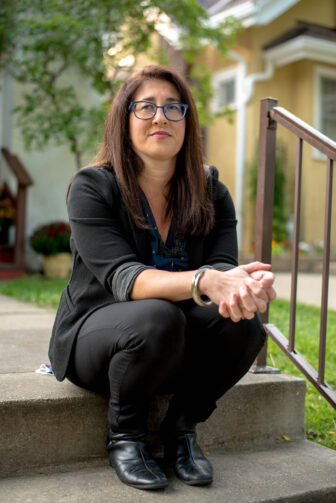‘Infodemic’ complicates Wisconsin’s public health fight against coronavirus
Even after his diagnosis, Johnson decried what he termed “unjustifiable hysteria” over the disease that has killed more than 230,000 Americans in about nine months. And Johnson said he remained opposed to mask mandates, agreeing with Republicans seeking to overturn a mandate ordered by Evers.
Confronting the infodemic
Amanda Simanek, a professor of epidemiology at UW-Milwaukee, called combating misinformation “a key component” of public health officials’ pandemic response.
“It’s not just treating patients,” said Simanek. “It’s not just testing. It’s not just contact tracing. Parallel to that, we have to help translate the science … in a way that manages misinformation.”

(Will Cioci / Wisconsin Watch)
Simanek is part of Dear Pandemic, a group of women epidemiologists and other researchers who are using social media and online reports to explain COVID-19 and tackle misinformation.
But fighting misinformation without inadvertently spreading it further is tricky.
“We don’t love to necessarily focus on amplifying a toxic message,” said Lindsey Leininger, a professor at Dartmouth College and group member. “Instead, we flip the narrative, and we talk about the durable lesson that comes from each piece of toxic misinformation.”
In West Bend, Tamez said he’s focused on having respectful conversations with his pandemic-skeptical patients. He’s steering them toward sources like the CDC and state DHS, but he understands why they might fall prey to inaccurate information.
“I think people are tired, and they just want some good news,” said Tamez. “And so any bit of good news, even if it’s misinformation, seems to spread like wildlife.”
Tamez, who said his daughter tested positive for COVID-19 in mid-October after likely being exposed at school, added that the pandemic is increasingly hard to miss in his community as cases surge — even if people want to ignore it.
“I guarantee you, three months ago people were looking at each other going, ‘I don’t even know anyone who has this, do you? This seems fake,’ ” he said. “And now, I can almost guarantee you every person in the county knows someone personally who has it.”
*** This article has been archived for your research. The original version from madison365.com can be found here ***


